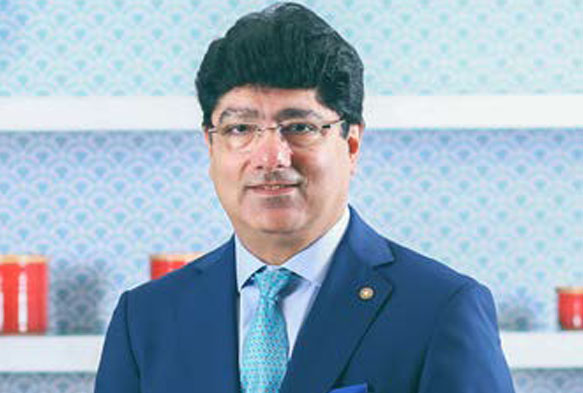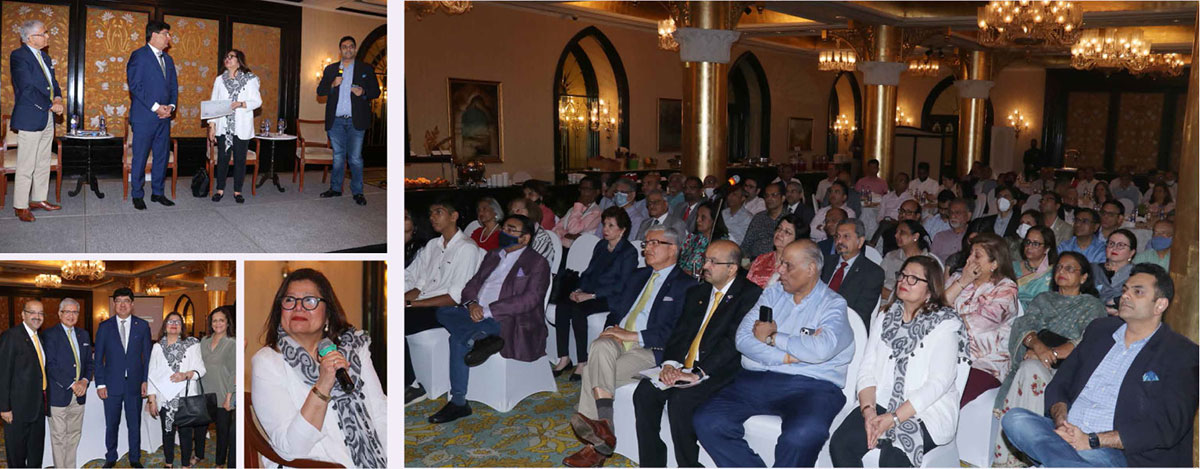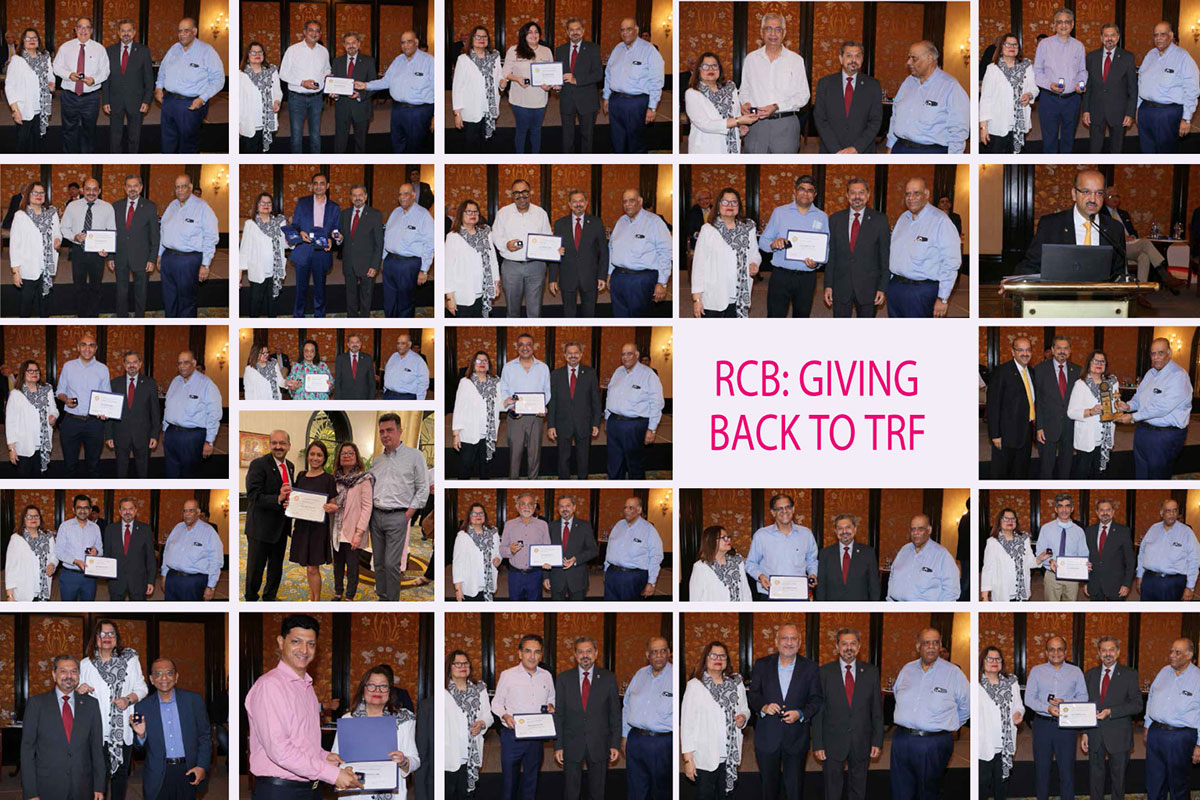
Rtn. Puneet Chhatwal, Managing Director & Chief Executive Officer, Indian Hotels Company Limited
There is no industry suffering as much globally as airlines, hospitality, and tourism.
The reality is this (hospitality) sector contributes more than 10% to the global GDP, more than 10% to the jobs in the world and, more interestingly, one out of every job comes from this sector. This includes everyone.
In India, we finished the meeting on National Tourism Policy last week, presented by the Secretary of Tourism to the Government of India, that 13.6% formal and informal jobs were created through this sector. What is informal? The shikhara on the Dal Lake, the pitthu guy who carries your bags while hiking, the rickshawwala from the Kashi Vishwanath Temple to the Benaras Ghat; so, a lot of lives are dependent on the sector.
How can this sector make a difference and how do we make a difference? There are five key pillars where you can have a positive impact – business, customer, people, industry and the nation itself.
Business is the most important thing because you cannot do service and community and look after people if you are not in business. Whether it is the business of providing service, it is business; if it is about doing CSR, it is still business; everything has to be looked at from a business point of view.
In 2018, Indian Hotels Company Limited announced our journey of aspiration for 2022. It was a simple pyramid saying that we will build on our value system of TATAs and values of Taj because that is our backbone. Indian Hotels Company Limited was the company formed 120 years ago by Jamshedji Tata; in 2017, we defined the values as trust, awareness, and joy. The five core values of TATA using our enablers of a string footprint legacy, properties assets, whatever we have and the three new initiatives – reimagining, restructuring, re-engineering our business to maintain what we have.
We added the word profitable; we want it to be most iconic and most profitable, how will we do it? We will do if we expand our EBIDTA margin from 17 to 25%, we will sign 15 new agreements on an average every year and we will balance our portfolio in being asset-heavy to asset-smart. For us, we define it as strategic, margin-enhancing, growth built on the principle of asset management relationships and continuous striking. So, the new growth will be more asset light, to get to a 50-50 balance portfolio in five years.
What have we delivered? Last year, Brand Finance, for the first time in the history of India, named it the world’s strongest hotel brand. The year before that we were the strongest brand across all sectors of India, then we got displaced so, we were very sad. Because Jio came out of nowhere and became number one; but we were still number two. You can’t be number one forever, then, when this prize came a week later, we were happy and relieved.
We were possibly one of the most profitable companies in early 2000s. Then, for a variety of reasons, international acquisition, sub-prime prices, hotels opening at the wrong time led us to become a 10-year period lossmaking company within one year; there was some accounting profit, but we have 10 consecutive years of not making money. Then we turn around, launching a project internally, project WIND to get to that 101 and then the 101 went to 250, and 350 but then covid came.
On growth, we added 70 contracts in the last three years; to date we are around 85 new agreements, and if 90% of those get billed, it is still 70 hotels. I can proudly tell you today, we have opened a hotel every month and, going forward, we will be opening at least 1.5 which means 18 hotels over the next 12 months. Our portfolio pre-Covid moved from heavy asset size to almost 46% portfolio. So, we achieved our target of iconic, profitability and growth. In 50% of the time the only thing we missed is having a balanced portfolio and I think we will get there and, also, unleashed the potentials of all the brands. So, instead of every brand serving the Taj, the time had come to let these brands become units of their own. And these can be businesses on their own. So, we brought in the impact of PML but also the scalability of the brand, so, Shamiana today is also in Dubai, the famous Machan in Delhi is also in the West End; Machan is also going international. A multiplicator impact of some of these brands, we have started using it. We are also taking the House of Ming from the Taj Delhi to London and then we added some new businesses whether it is Qmin, food trucks.
Now, one thing people should not forget is that we need to communicate as a company, and we are doing that. But, also, would like you all to be the ambassadors in whatever segment or business we are in, we will be the premium in that segment. Our ambition will always be to be the Taj of the homestays, homedelivery, to be the Taj in the Ginger Hotels segment without calling it the Taj. The best way to ruin a brand is to give it crutches before it is allowed to walk on its own feet. That means by adding ‘By Taj,’ you get revenues in the short term but in the long-run the brand never has its identity and you end up diluting your mainstream brand. The backbone of the company, the cashflow generator, the status. So, we should use it very carefully. So, some of you who must be wondering that there is a sudden change in the Taj Vivanta, Taj Salons, and it is a very informed change, a change done of purpose, I hope nobody reverses that for short-term gain because that will be counter-productive.
Now, we come to customer experience; how do we start? Firstly, we had to make the customer feel good, so we came up with ‘Tajness’, a commitment to strengthen and see how to leverage digital, how to save sanitary practices so that not only our customers, but our employees too are safe. We had to do it for all with eventually the customer in mind. We launched this across the system in very short period. We came up with new promotions and brands without any investment. It was all based on incremental cost and revenue. It was the same people, same staff, same kitchen packing and delivering, we had a delivery service but that is all only if there is a cost added to it. So, all these helped us, of course, with the background of our experiences and that is a picture much before the time of reopening after 26/11. And taking the spirit and courage of those times. And then came to peoples’ lives, how to make a difference in their lives? This is very people intensive; it is a capital-intensive business. So, we organised a vaccination campaign, all our employees are vaccinated, 99% are double vaccinated, if the booster will be allowed, we will go ahead with that too.
We tied up with our own medical groups, testing drives across hotels, a panel of doctors pan-India for assistance, virtual homecare support and all co-ordination of medical facilities. I have worked internationally but this was an eye-opener for me in India because our people did a phenomenal job. We had apps and competitions, people counting number of steps, competing with each other, HealthifyMe. A one-to-one counselling, a lot of people having challenges at homes, parents tested positive, elderly and other challenges; we tried to support them, did yoga virtually, we did a lot of employee engagement and communication on a fortnightly and monthly basis.
Making a difference in the nation’s prosperity, there we contributed fairly. The group founder’s philosophy that in a free enterprise the community is just not another stake holder in business but it is in fact the very purpose of its existence. I think this is our guiding philosophy. A friend of mine, we celebrated last week by calling all the doctors who fought Covid in the government hospitals; we spent time at Sion Hospital with the nurses and other staff. What do I see there? The first human milk bank for babies. Started in 1989 by Taj and that is at the entrance of that human milk bank space by the then C&MD. In the evening, we had the doctors and deans of all these hospitals on the terrace. A friend of mine is Sanjeev Kapoor, I always say he made the word Chef a respectable profession in the early ’90s through Khana Khanzana. He called me on March 18th, 2020, saying, ‘Chal yaar kuch karte hai, kya karna hai? Let’s start giving food.’
I said, ‘What will that do?’ He said, ‘You will see; if we join, we do this, everybody else will follow.’ It was not just us who did that in the hospitals but in the end, we were almost in 17 cities, all across and served 4.5 million meals and the day when we had migrant people challenges, it was more than 50,000 meals because 35,000 were only for migrants.
Besides these meals, we also hosted 120,000 bed nights for around 75,000 plus; there were cases where the beds were shared but these were nurses and other hospital staff, only the senior doctors had single rooms. All of this was subsidised by the Taj Public Service Welfare Trust and the Trust suddenly started getting money except for a few people. Renu Basu called to donate, we got from Deutsche Bank, a bank from Scotland. I think we crossed 30 crores. We had not had such collection between 26/11 to 2020. This was a great help. I think that is what it was. I am sure there is more that we could have done but let us feel happy and proud of what you never thought you will be able to do because when you look at the traffic now, we forget, but me living on the Peddar Road, you know that there were times when you could just walk and nothing passed by, not even a cycle. I think we faced extraordinary times. Coming to a haunted airport, getting in one elevator, and getting out from another, getting a stamp of home-quarantine. I hope we don’t see such a situation in our lifetime.
What can India learn to make travel and tourism prosper and what can Taj teach other iconic hotels?
The time has come to include the tourism in the concurrent list of the Constitution. It is not easy because it requires constitutional amendment and that has to be done in the Parliament but at some point, it should be done. It is not for the benefit of the industry but for the benefit of the nation. Second, tourism should be granted infrastructure status. If the government focusses on the infra then there is no better industry that can serve its purpose as an asset class and giving it infrastructure status will make it competitive, specially with the job multiplicator effect.
It should get an industry status at the state level, taxing this hotel highest on electricity or utilities is fine but taxing the entire sector the highest more than commercial property is not looking forward. So, I am glad to say that Maharashtra was one of the first states in middle of pandemic to granted hospitality industry status. It is a state subject and infra is at Centre. The ECLGS helps you to survive but it is not a solution; in long term, it is credit to pay past credit and sometimes both the principle and interest have to be repaid. We have embarked on a ‘Taj supporting the CII’ initiative on skilling and we will soon announce that we will be skilling to the north of several thousand people both nationally and internationally. I think that is it.
With international travel going up, can we look at better days for the industry?
I have a different opinion; I think the international is only the icing on the cake. One of our very successful campaigns was the Dekho Apna Desh which came from PM. 85% of our business is always domestic and the countries where we are present like London, Paris and NY, there it is important because these are the three top lodging markets of the world. It is also important for a country where the GDP contribution is 20-25% which are so dependent on international traffic. When it comes to business and tourism, if addressed properly, we are Atmanirbhar. International is the icing that takes you to extra levels of profitability. Of course, if we can increase it, because there is nothing that India doesn’t have, but that will take some time. I think we are on a very solid and good batting wicket. International will change as the infrastructure improves.
What about infrastructure in domestic?
During the lockdown, a strange thing happened; a lot of people drove without their drivers. Many took families to short vacations like never before. I think this is a very important change. For a majority, it was matter of time to decide where to go. It happened to more than 50% and it is encouraging to growth and development of roads and infrastructure.



